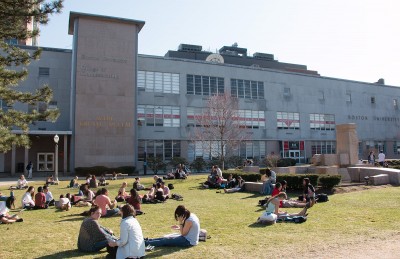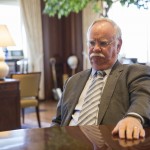
Communication jobs in academia nationwide have increased 1.6 percent since 2013, according to a Thursday report by the National Communication Association.
The report found that communication faculty jobs advertised by schools increased from 351 positions in 2009 to 752 positions in 2014. In collecting data, the NCA tracked college and university positions in the field by examining job postings.
Tammy Vigil, a professor at Boston University’s College of Communication, said the results of the report are in line with an increased emphasis on communication in society.
“It is important to understand communication ’cause it’s one of the most fundamental things we do as humans,” she said. “The more we study it, the more we understand it [and] hopefully the better we get at it, but also the more we can guard against the potential pitfalls that could come up.”
The report breaks down the job postings by communication specialties. Postings for general communication practitioners outnumbered postings for specialists, the report stated. The most common specialties on the postings were digital and emerging media, public relations and mass communication and media studies.
Vigil said there has been more interest in specialized communication fields at BU including emerging media, mass communication and public relations.
The report stated it is important to compare communication with other subjects within humanities.
“Particularly in the humanities, considerable discussion occurs in the higher education news media about the annual rate of job growth (or decline) as reported by individual disciplines,” the report stated. “Despite concerns about relying on job postings as an exclusive measure of academic job markets, higher education economists and researchers have concluded that such analyses are nonetheless useful.”
Vigil said the growing interest among students to study communication fields forces universities to be competitive in their hiring processes.
“If we hire more faculty, we can show that [communication is] a growing field and that means the students will benefit,” she said. “We’re making sure that we continue to understand that we have competition too, that we’re not the only school out there, and so it’s kind of a prod to make sure that we’re staying and keeping on our toes … others are hiring young innovative interesting people to teach these kinds of courses. It helps us to remember to be competitive.”
Several students said the increased number of communication job postings reflects a greater interest in the field for students and faculty members.
Samantha Kelley, a freshman in COM, said job postings can be useful in attracting diverse faculty members with new ideas to the college.
“BU’s COM department is getting wider recognition as the years go by,” she said. “Maybe they’ve been hiring more instructors and expanding different fields, like the new emerging media program. That sounds interesting and definitely appealing.”
Shuyun Zhang, a sophomore in COM, said the increasing popularity in communication fields increases competitiveness among students.
“[The increase in jobs] will not necessarily [affect] faculty members, but just [have] more and more students coming to COM,” she said. “Maybe it will also make BU’s COM more competitive ’cause we have to keep up with other colleges.”
Deijah Lee-Carroll, a freshman in COM, said improving the university’s communication programs requires a large faculty pool.
“In a way, it’s like an increase in demand in faculty members, and I’m not entirely surprised,” she said. “Communication studies is definitely developing with all these technologies, so additional faculty members is not something unexpected and is actually important.”















Great article, Sekar Krisnauli and useful information. It’s important that our university com departments stay current in emerging media and mass communications as the job market requires the field to adapt to new technology and forms of communication.